Chesapeake Monitoring Cooperative heads upstream to Carlisle, PA
 The Chesapeake Monitoring Cooperative met at Dickinson College in Carlisle, Pennsylvania in June. Dickinson College is the home of the Alliance for Aquatic Resource Monitoring (ALLARM), a partner in this project. Chesapeake Monitoring Cooperative envisions a Chesapeake community where all data of known quality are used to inform watershed management decisions and restoration efforts. This project is funded by the U.S. EPA's Chesapeake Bay Program and includes several important factors, such as training sessions for non-traditional monitoring groups, a database that incorporates a variety of non-traditional monitoring data, and assessment of the monitoring data (i.e., report cards).
The Chesapeake Monitoring Cooperative met at Dickinson College in Carlisle, Pennsylvania in June. Dickinson College is the home of the Alliance for Aquatic Resource Monitoring (ALLARM), a partner in this project. Chesapeake Monitoring Cooperative envisions a Chesapeake community where all data of known quality are used to inform watershed management decisions and restoration efforts. This project is funded by the U.S. EPA's Chesapeake Bay Program and includes several important factors, such as training sessions for non-traditional monitoring groups, a database that incorporates a variety of non-traditional monitoring data, and assessment of the monitoring data (i.e., report cards).
IAN creates tidal water quality factsheets for volunteer monitors
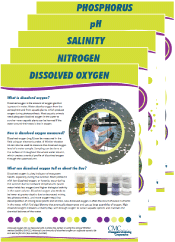 As part of the Chesapeake Monitoring Cooperative project, IAN produced 12 factsheets describing 14 tidal water quality indicators. These indicators are part of the CMC's tidal water quality Quality Assurance Project Plan and Method Manuals. The factsheets are intended for nontraditional and volunteer monitoring groups to include as part of their water quality monitoring programs as education materials for their volunteers. Additionally, IAN produced 20 matrices that illustrate the overlap between volunteer and nontraditional monitoring groups with the Chesapeake Bay Agreement's outcomes and goals. These products are part of the broader goal of the project to integrate volunteer and nontraditional monitoring data into the Chesapeake Bay Program's monitoring networks.
As part of the Chesapeake Monitoring Cooperative project, IAN produced 12 factsheets describing 14 tidal water quality indicators. These indicators are part of the CMC's tidal water quality Quality Assurance Project Plan and Method Manuals. The factsheets are intended for nontraditional and volunteer monitoring groups to include as part of their water quality monitoring programs as education materials for their volunteers. Additionally, IAN produced 20 matrices that illustrate the overlap between volunteer and nontraditional monitoring groups with the Chesapeake Bay Agreement's outcomes and goals. These products are part of the broader goal of the project to integrate volunteer and nontraditional monitoring data into the Chesapeake Bay Program's monitoring networks.
IAN shows support for collaborative public science
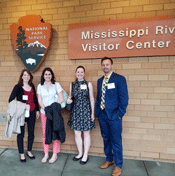 IAN staff Caroline Donovan, Alex Fries, and Suzi Spitzer attended the biennial Citizen Science Association Conference from May 17-19. Our work at IAN was well-represented— Caroline co-hosted a data communication workshop, Alex promoted the Chesapeake Monitoring Cooperative during the Project Slam, and Suzi presented results from her dissertation research. The conference was held in Saint Paul, Minnesota and was attended by citizen science researchers and practitioners from all over the country and across the globe. You can read more about our conference experience in several blog posts!
IAN staff Caroline Donovan, Alex Fries, and Suzi Spitzer attended the biennial Citizen Science Association Conference from May 17-19. Our work at IAN was well-represented— Caroline co-hosted a data communication workshop, Alex promoted the Chesapeake Monitoring Cooperative during the Project Slam, and Suzi presented results from her dissertation research. The conference was held in Saint Paul, Minnesota and was attended by citizen science researchers and practitioners from all over the country and across the globe. You can read more about our conference experience in several blog posts!
Chesapeake Monitoring Cooperative presents at the Chesapeake Watershed Forum
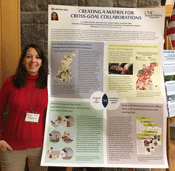 Caroline Donovan recently presented a poster on the Indicator Effectiveness Matrix, which demonstrates overlapping objectives between the Chesapeake Bay Program's Management Strategies and volunteer monitoring groups at the Chesapeake Watershed Forum. The Watershed Forum is an excellent venue for networking as well as learning about a variety of management and restoration activities throughout the watershed. IAN staff attend every year and enjoy it thoroughly! This year Emily Nastase, Dylan Taillie, Suzi Spitzer, and Vanessa Vargas presented in different sessions, with topics ranging from art in science to collaborative tools for stakeholder engagement.
Caroline Donovan recently presented a poster on the Indicator Effectiveness Matrix, which demonstrates overlapping objectives between the Chesapeake Bay Program's Management Strategies and volunteer monitoring groups at the Chesapeake Watershed Forum. The Watershed Forum is an excellent venue for networking as well as learning about a variety of management and restoration activities throughout the watershed. IAN staff attend every year and enjoy it thoroughly! This year Emily Nastase, Dylan Taillie, Suzi Spitzer, and Vanessa Vargas presented in different sessions, with topics ranging from art in science to collaborative tools for stakeholder engagement.
UMCES holds workshops for the Chesapeake Monitoring Cooperative
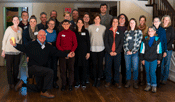 In the last month, IAN held two workshops for Chesapeake Monitoring Cooperative (CMC) members and interested parties that focused on interpreting and visualizing data. The first workshop was hosted at the Audubon Naturalist Society in Chevy Chase, MD and was a two-day introduction to data interpretation and visualization. UMCES developed a Data Interpretation and Synthesis Methods Manual for this workshop in order to assist students with the concepts introduced. The second two-day workshop, held in Annapolis, MD, provided advanced data interpretation to CMC groups and helped them to better communicate their monitoring data.
In the last month, IAN held two workshops for Chesapeake Monitoring Cooperative (CMC) members and interested parties that focused on interpreting and visualizing data. The first workshop was hosted at the Audubon Naturalist Society in Chevy Chase, MD and was a two-day introduction to data interpretation and visualization. UMCES developed a Data Interpretation and Synthesis Methods Manual for this workshop in order to assist students with the concepts introduced. The second two-day workshop, held in Annapolis, MD, provided advanced data interpretation to CMC groups and helped them to better communicate their monitoring data.
Chesapeake Monitoring Cooperative's (CMC) Data Interpretation and Science Communication Workshop
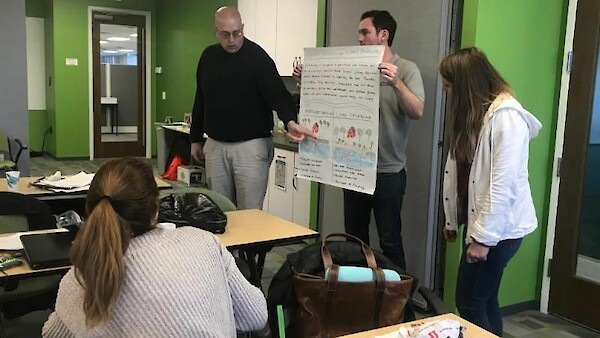
Richmond, Viginia and Carlisle, Pennsylvania, USA. The CMC trained approximately 20 people in Data Interpretation and Science Communication in February. The free 2-day workshop is part of the CMC's training services and include hands-on, immersive training in data interpretation, conceptualization, storytelling, and design and layout. One workshop was hosted at the Virginia Department of Environmental Quality's office in Richmond, VA and the other was hosted by the Alliance for Aquatic Resource Monitoring at Dickinson College in Carlisle, PA. The participants were asked to bring a spreadsheet of their data, as well as an idea for a science communication product that they could work on developing throughout the two-day course. There were a lot of impressive results from both workshops! Check out this blog for a more in-depth look!
Upcoming meetings and conferences
IAN projects and employees will be attending and presenting at a variety of virtual conferences this spring and summer, including:
- At the upcoming National Monitoring Conference this month, Caroline Donovan will present on behalf of the Cheseapeake Monitoring Cooperative.
- At the Citizen Science conference CitiSciVirtual: Local, Global, Connected in May, Caroline Donovan will attend on behalf of the Chesapeake Monitoring Cooperative. Look for the CMC's viritual poster!
- At the International Coral Reef Symposium in July, we will present the Coral Reef Ecosystem Status and Trends Report Cards
Chesapeake Monitoring Cooperative In-Person Meeting
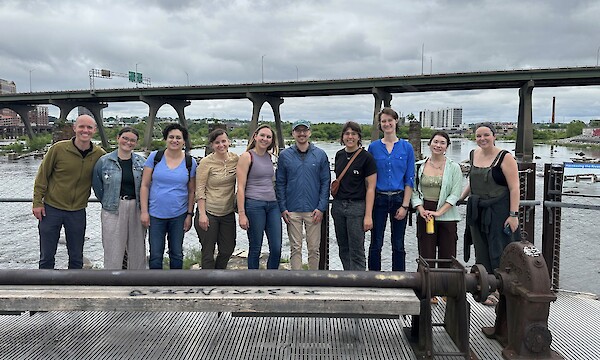
On May 15th and 16th, Ann Foo and Sidney Anderson attended the in-person meeting for the Chesapeake Monitoring Cooperative in Richmond, Virginia, hosted by the Alliance for the Chesapeake Bay. This project, entering its fourth year, is a collaboration among Maryland, Pennsylvania, and Virginia aiming to support water monitoring across the Chesapeake Bay Watershed and make that data accessible to those interested in it. Members from each organization gather once a year to assess upcoming goals, new ideas, and strengthen the cooperative team.
Insights from the Choose Clean Water Conference
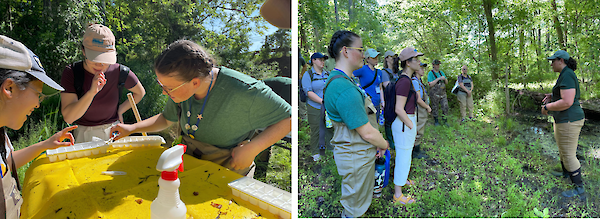
Last month, Sidney Anderson, Ann Foo, and Nathan Miller attended the Choose Clean Water Conference in Ellicott City, Maryland. Each year, representatives from riverkeeper organizations, universities, environmental advocacy non-profits, and government agencies from around the Chesapeake gather to share new research, network, and exchange ideas over how everyone’s collective work can improve both the ecology of the Bay and the communities that live in its watershed. Plus it’s a chance for everyone to collect really cool swag! Sidney, Ann, and Nathan attended as the IAN contingent of the Chesapeake Monitoring Cooperative, which helps citizen scientists collect quality freshwater data in the Chesapeake tributaries. Their presentation, “Masters of Translation: Best Practices in Science Communication,” covered general principles of science communication and how to co-develop science communication products via stakeholder engagement. Attendees got the chance to practice their science communication skills during the presentation, as well through activities like “Conceptionary” and “Title Pursuit.”
Recent IAN publications
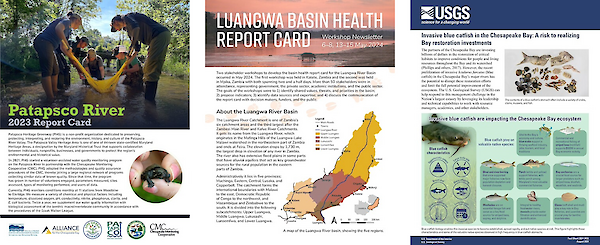
Check out some of the following publications we had last month:
- Patapsco River 2023 Report Card: This report card, produced with Patapsco Heritage Greenway as part of the Chesapeake Monitoring Cooperative, assesses the condition of the Patapsco River using volunteer monitoring data for the second year in a row.
- Luangwa River Workshop Newsletter: This newsletter summarizes the results of two stakeholder workshops held in May 2024 for the development of the Luangwa River Basin Report Card with WWF Zambia.
- Invasive blue catfish in the Chesapeake Bay: A risk to realizing Bay restoration investments: In collaboration with the U.S. Geological Survey (USGS), this fact sheet highlights the characteristics of invasive blue catfish, emphasizes the spread of blue catfish in the Chesapeake Bay over time, and informs about the capabilities of USGS to respond to this management challenge.
19th Annual Chesapeake Watershed Forum
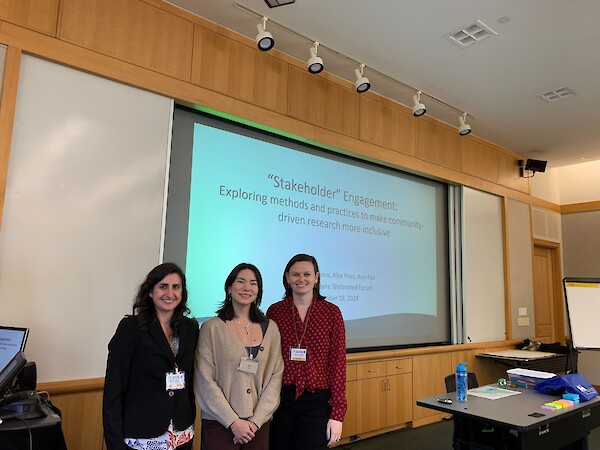
Every year, we attend the Chesapeake Watershed Forum in West Virginia. Our presence at this meeting solidifies our partnership with the Chesapeake Monitoring Cooperative and the Alliance for the Chesapeake Bay. This year, Annie Carew, Ann Foo, and Alex Fries presented two workshops: one on stakeholder engagement, and one on science communication. Both workshops were well-attended, and attendees were enthusiastic and engaged about the material. We enjoyed getting to speak to people from across the Chesapeake watershed about our work and theirs.
Chesapeake Monitoring Cooperative Database Reaches 1 Million Water Quality Samples
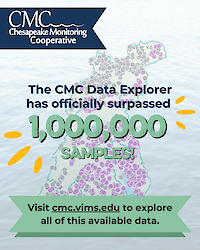
The Chesapeake Data Explorer has reached one million water quality samples! This achievement reflects the efforts of all the monitoring volunteers, coordinators, waterkeepers, and partner organizations who have worked hard to collect water monitoring data all over the Chesapeake Bay watershed. The Chesapeake Monitoring Cooperative (CMC) collects and publishes this data through the Chesapeake Data Explorer for use by the Chesapeake Bay Program and state water assessments.
Making Connections at the National Water Quality Monitoring Conference
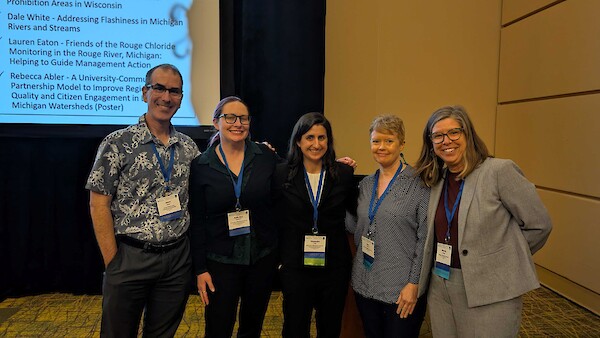
From March 10–14th, Alexandra Fries and Katie May Laumann attended the 14th National Water Quality Monitoring Council Conference in Green Bay, Wisconsin. Alex hosted a session on Putting Monitoring Data to Work: Using Data Interpretation for Management Actions, with great speakers from Patapsco Heritage Greenway, Loudoun Wildlife Conservancy, and Arizona Department of Environmental Quality. Katie May also presented on using report cards to communicate improvements in Chesapeake Bay water quality and the MD Coastal Adaptation Report Card. Alex presented on the NOAA Coral Reef Status Reports. Overall the conference was a great success, with a lot of new ideas for water quality monitoring, meetings with partners from the Chesapeake Monitoring Cooperative, and making new connections across the country.
Antietam Creek Watershed Report Card
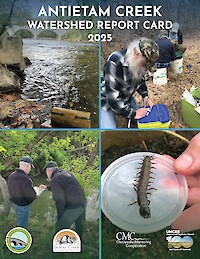
The Antietam-Conococheague Watershed Alliance (ACWA) released their first-ever Report Card in June. IAN worked with ACWA to develop this report card as part of our ongoing collaboration with the Chesapeake Monitoring Cooperative. Antietam Creek and its watershed received a moderate score of 48%, a C. This area faces challenges from land use changes, and the creek is still recovering from a large fish kill in 2023, the cause of which is still uncertain.
Third annual Patapsco Report Card out now
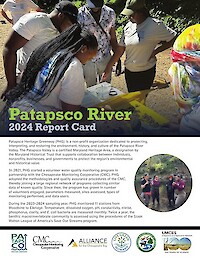
Patapsco Heritage Greenway (PHG) has released its third annual Report Card in partnership with the Chesapeake Monitoring Cooperative (CMC) and UMCES IAN. PHG started its water quality monitoring program in 2021 and now monitors 11 locations along the river. The Patapsco River earned a C+ this year, and conductivity continues to score poorly, likely due to years of excessive and inefficient winter salting practices. PHG offers Smart Salter workshops to combat this, where volunteers can learn how to monitor chloride using a Salt Watch kit and how to use salt and alternatives more efficiently on surfaces during winter. Check out the report card and learn more at https://www.patapsco.org/water-quality-monitoring/.
This report card also spotlights the Daniels Dam Feasibility Study. The Maryland Department of Natural Resources is considering whether or not to remove the dam. Removal of other dams along the Patapsco has improved ecosystem health and restored access to natural habitats. To learn more and contribute your thoughts, visit https://dnr.maryland.gov/publiclands/Pages/daniels-dam-feasibility-study.aspx.
New fact sheets on water quality indicators
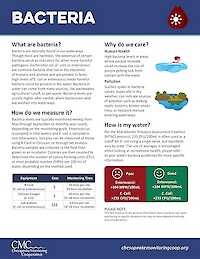
This summer, the Chesapeake Monitoring Cooperative (CMC), a multi-state effort to standardize water quality monitoring throughout the watershed, redesigned indicator fact sheets. These fact sheets give an overview of each water quality indicator, why it is important to the ecosystem, the tools used to measure the indicator, and what certain types of measurements and scores mean for water health. The new documents can be found on the CMC website and the IAN website.
Celebrating Ten Years of Chesapeake Monitoring Cooperative
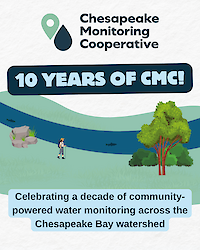
Over the past 10 years, the Chesapeake Monitoring Cooperative has grown into a network of volunteers, organizations, and partners working together to improve our understanding of the Chesapeake Bay. Together, we’ve collected over 1.1 million water quality data points, built tools like the CMC Data Explorer, and ensured community science plays a role in Bay restoration and management decisions. Thank you to everyone who made all these milestones possible. Here’s to the next decade of collaboration and impact!
Loudoun Streams Report Card Release Event
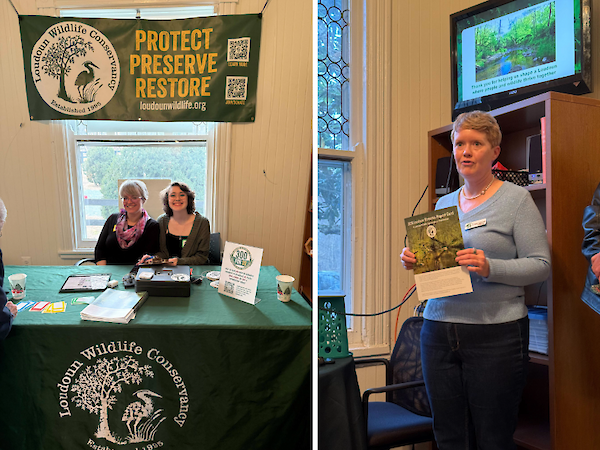
Loudoun Wildlife Conservancy released the 2025 Loudoun Streams Report Card on November 17, 2025. Alexandra Fries was able to attend a celebratory event they held at their office in Leesburg, VA on December 13, 2025. This is their first report card and was created in conjunction with the Chesapeake Monitoring Cooperative and UMCES. Loudoun Wildlife Conservancy (LWC) has over 150 volunteers who conduct chemical, biological, SaltWatch, and NitrateWatch data. The report card includes scores for biological monitoring, conductivity, nitrate, phosphate, chloride, and water clarity. Amy Ulland, the President and Stream Monitoring Coordinator for LWC, presented on the report card and results at the event. The overall grade was C+ (58%), showing a mix of strengths and concerns.
CMC Fact Sheets Now Available in Spanish
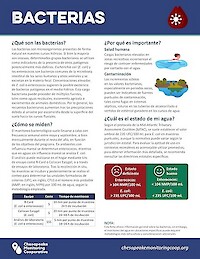
Last year, the Chesapeake Monitoring Cooperative (CMC), a multi-state effort to standardize water quality monitoring throughout the watershed, redesigned indicator fact sheets. These fact sheets give an overview of each water quality indicator, why it is important to the ecosystem, the tools used to measure the indicator, and what certain types of measurements and scores mean for water health. Now, the fact sheets have been translated into Spanish! The new documents can be found on the IAN website.